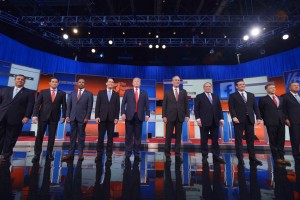Game Theory and the Republican Primary
Game theory as defined by the Merriam-Webster dictionary is the analysis of a situation involving conflicting interests in terms of gains and losses among opposing players. While learning about game theory in an academic setting, it is easy to forget how such a wide encompassing theory can be applied to a seemingly unlimited number of everyday situations. Although many of these everyday situations are often in business settings, involving the interactions between differing firms, the main concepts can be applied to politics, more specifically the political race leading up to an election. This is especially notable given how the Republican presidential debate and primary have been going.

The best way to analyze the Republican presidential primary with game theory would be through the eyes of a registered Republican voter. With so many options – ranging from the eccentric, flamboyant Donald Trump, to the more reserved Dr. Ben Carson – voters know that should they support a candidate who is not polling well, they will likely have to make concessions and vote for a candidate with a chance of receiving the nomination.
As John Patty with the Washington Post described it in his article What game theory tells us about Wednesday’s debate and the Republican primary, many Republican voters are “strategic” in their decision making. So what does a “strategic” voter do when the candidate whose views most closely align with their own is polling near the bottom? Patty describes how in a “winner-takes-all” election, the only true race is between the leading candidate and the candidate in second place. The rest of the candidates are essentially noise, taking votes away from the two candidates who can actually win.
However, the Republican primary is unique in how the second place candidate has been changing rather radically and in an almost unpredictable fashion. Many saw Jeb Bush as party’s front runner early on, however when Trump took that spot by an over 10% lead, Bush was bumped to second place. Soon after, Dr. Ben Carson took that spot. This leaves the second place spot in the polls essentially open to the candidate who can differentiate themselves enough and gain popularity. John Patty notes in his analysis of the race that this can be done by coordination of the voters through focal points.
Focal points, also known as “Schelling points” after the Noble laureate who described it, is the idea that when players in a game cannot communicate, the solution is a player’s expectation of what the other expects him to expect to be expected to do. More simply in the context of the Republican primary, Patty describes it as a “non-leading candidate that people realize that others will realize is a good candidate to start supporting”. Essentially should a candidate stand out enough, and Republican voters have a general feeling that the candidate can win and that others also feel this way, they may converge on this candidate in the polls in order to move up their ranking.
With this in mind, as well as in how CNN structures the debate (If a candidate mentions another by name, the candidate mentioned is given a chance for a rebuttal), Patty laid out a simple strategy for the debate as well as the primary in general:
| First Place Candidate | Mention the last placed candidate, avoid the second placed candidate |
| Second Place Candidate | Mention the first placed candidate, avoid the third placed candidate |
| Everyone else | Attempt to differentiate from all other non-first/second placed candidates, while attempting use the techniques of the first and second place candidate to gain appeal |
This analysis by Patty was especially interesting given the topics of study in our course. Game theory really is applicable to many every day scenarios as well as national stories of interest. While watching the debate, I myself considered the differing strategies of the candidates but did not consider the strategies of the viewers and voters. Studying the strategies of the average voter, as well as the possibility of their using focal points (either knowingly or not), is extremely interesting and will continue to be stimulating as the Republican primary continues and candidates attempt to increase their poll numbers through differing strategies.
http://www.theguardian.com/us-news/2015/aug/05/game-theory-republican-presidential-debate
http://econweb.ucsd.edu/~vcrawfor/CrawfordGneezyRottenstreichAER08.pdf
